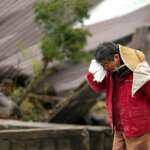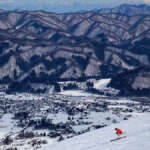A Closer Look at Japan
Japan Flag

Japan Formation Date
The formation date of Japan is February 11, 660 BC.
Japan Capital Name
Tokyo
Japan Neighbours
Exploring Japan
Japan: A Land of Rich Culture and Endless Wonders
Located in East Asia, Japan is an archipelago of 6,852 islands, with four main islands - Honshu, Hokkaido, Kyushu, and Shikoku. The country's name, "Nippon" or "Nihon," translates to "Land of the Rising Sun," symbolizing its location in the east where the sun rises. Japan is a country steeped in history, culture, and natural beauty, making it a top destination for travelers from all over the world.Key Takeaways:
- Japan is an archipelago of 6,852 islands.
- The country's name translates to "Land of the Rising Sun."
- Japan is known for its rich culture, history, and natural beauty.
Geography:
Japan's geography is diverse and unique, with mountains covering 75% of the land. The country is also home to over 100 active volcanoes, including Mount Fuji, the highest mountain in Japan. The mountains provide a stunning backdrop to the country's urban areas and are popular for hiking and skiing. Japan is also blessed with abundant natural resources such as fish, timber, and minerals. Its location on the Pacific Ring of Fire makes it prone to earthquakes and tsunamis. The climate in Japan varies from region to region but is generally temperate with four distinct seasons. Summers are hot and humid, while winters can be cold and snowy. Spring and autumn are considered the best times to visit Japan when the weather is mild and pleasant.Origin and History:
Japan has a rich history dating back thousands of years. The earliest known civilization in Japan was the Jomon culture, which existed from around 14,000 BC to 300 BC. The country was ruled by various clans until the 12th century when the first shogunate, or military government, was established. In the late 19th century, Japan underwent a period of modernization and opened up to the rest of the world. In the 20th century, Japan played a significant role in World War II and experienced a period of economic growth known as the "Japanese Miracle." Today, Japan is a modern and technologically advanced country while still preserving its rich cultural heritage.Government and Politics:
Japan is a constitutional monarchy with a parliamentary system of government. The Emperor is considered the symbol of the state, while the Prime Minister is the head of government. The country is divided into 47 prefectures, each with its own elected governor. Japan has strong diplomatic ties with other countries and is a member of organizations such as the United Nations and G7.Commerce and Economy:
Japan has one of the largest economies in the world, with a focus on manufacturing and technology. The country is known for its production of cars, electronics, and machinery. Japan also has strong trade relations with other countries, particularly with China and the United States. The Japanese currency is the yen, which is widely used in international trade.Demographics:
Japan has a population of approximately 126 million people, with most living in urban areas. The majority of the population is ethnically Japanese, but there are also minority groups such as Koreans and Chinese. The country has an aging population, with a declining birth rate and increasing life expectancy.Culture:
Japan's culture is a blend of ancient traditions and modern influences. The country is famous for its art, including traditional forms such as calligraphy, pottery, and woodblock prints, as well as contemporary forms like anime and manga. Music plays a significant role in Japanese culture, with traditional instruments such as the shamisen and koto still used today. Festivals and traditions are an essential part of Japanese culture, with events such as cherry blossom viewing and the Bon Festival celebrated throughout the year.Languages and Religion:
The official language of Japan is Japanese, which has several regional dialects. English is also widely spoken, particularly in major cities and tourist areas. The dominant religion in Japan is Shintoism, which focuses on the worship of nature and ancestors. Buddhism is also prevalent in Japan, and many people practice both religions.Education and Healthcare Systems:
Japan has a highly developed education system, with a 99% literacy rate. The country has a compulsory education system for children aged 6 to 15 years old. Higher education is also highly valued in Japan, with top universities such as the University of Tokyo consistently ranking among the best in the world. Japan's healthcare system is universal and considered one of the best in the world. The country has a high life expectancy and low infant mortality rate, thanks to its advanced medical technology and public health initiatives.Sports and Recreation:
Baseball is the most popular sport in Japan, with sumo wrestling also being a significant cultural tradition. Other popular sports include soccer, golf, and martial arts such as judo and karate. Japan has hosted several international sporting events, including the Olympics and FIFA World Cup.Tourism:
Japan is a top tourist destination, offering something for everyone. The country is known for its stunning natural landscapes, including Mount Fuji, hot springs, and national parks. Cities like Tokyo, Kyoto, and Osaka offer a mix of modern attractions and traditional sites such as temples, shrines, and gardens. Japan also has a well-developed transportation system, making it easy for tourists to explore the country.Travel Information for Foreign Visitors:
Visitors to Japan must have a valid passport and may require a visa depending on their country of origin. The country is generally safe for travelers, but it is essential to be aware of local customs and etiquette. Japan is a cash-based society, but credit cards are widely accepted in major cities. The currency used is the yen, with 100 yen being equivalent to approximately 1 USD.Quotes:
- "The Japanese say you have three faces. The first face, you show to the world. The second face, you show to your close friends, and your family. The third face, you never show anyone. It is the truest reflection of who you are." - Unknown
- "Japan is the most intoxicating place for me. The Japanese culture fascinates me: the food, the dress, the manners and the traditions. It's the travel experience that has moved me the most." - Roman Coppola
- "Japan never considers time together as time wasted. Rather, it is time invested." - Donald Richie
In Conclusion:
Japan is a country that never fails to captivate and enchant visitors. From its rich culture and history to its modern advancements and stunning natural beauty, there is something for everyone in this unique destination. As Japan continues to evolve and grow, it will undoubtedly remain a top travel destination for years to come.Japan Highest Point Name
The highest point in Japan is Mount Fuji, standing at 3,776.24 meters (12,389 feet) above sea level.
Japan Highest Point Value
3,776 m
Japan Capital Longitude
Tokyo, the capital of Japan, is located at 35.6895° N, 139.6917° E.
Japan Capital Latitude
Tokyo, Japan 35.689487
Japan Official Languages
The official language of Japan is Japanese.
Japan Ethnic Groups
The major ethnic group in Japan is Japanese. Japan is an ethnically homogeneous society comprised of 98.5% ethnic Japanese. Other ethnic groups present in Japan include Koreans (1.4%), Chinese (0.5%) and the indigenous Ainu people (0.5%). Smaller minority populations include the Ryukyuans (Okinawans), Filipino, Vietnamese, and Brazilian as well as mixed ancestries. Japanese cultural is also influenced by various other cultures, such as the North American, European and African cultures.
Japan Religions
Religion is generally considered to be an important part of life in Japan. The two main religions practiced in Japan are Shinto and Buddhism. Shinto is an indigenous religion of Japan and involves a belief in Kami (or spirits) of nature. Buddhism, on the other hand, was imported from China during the 6th century and is based on the teachings of the historical Buddha. Religious practice in Japan is generally not enforced, and many Japanese are only casually or culturally religious, while others do not practice a religion at all. Other minor religious groups in Japan include Christianity, Confucianism, Taoism and Tenrikyo. Shinto and Buddhism remain the dominant beliefs, though, and establish key patterns in the life of many Japanese people.
Japan Total Area
The total area of Japan is 377,915 square km (145,877 square miles).
Japan Land Area
The total land area of Japan is 377,944 square kilometers (145,908 square miles).
Japan Water Area
Japan is estimated to have a total water area of 270,500 square kilometers. This includes water bodies such as the Pacific Ocean and the Sea of Japan, as well as the numerous rivers and lakes that make up the country's inland water bodies. The largest water body in Japan is Lake Biwa, which covers 639 square kilometers.
Japan Total Population
The total population of Japan as of 2020 is 126.8 million people.
Japan Currency Name
The official currency of Japan is the Japanese Yen (JPY).
Japan Currency Code
The country currency code for Japan is JPY.
Japan Currency Symbol
The currency symbol for Japan is ¥
Japan Time Zones
- UTC+09:00
Japan has one standard time zone and no daylight saving time. UTC+9, also known as Japan Standard Time (JST), is used as the official standard time throughout all of Japan. Japan does not observe daylight saving time, which means that the standard time is kept throughout the year. In some areas, such as Okinawa, the local time is slightly different from JST.
Japan Calling Code
91The country calling code for Japan is +81
Japan Internet TLD
www.aveholidays.jp
How to Say "Japan" In Different Languages?
- Portuguese
- Japão (pt-BR)
- Chinese
- 日本 (zh-CN)
- Arabic
- اليابان (ar-EG)
- French
- Japon (fr-FR)
- German
- Japan (de-DE)
- Greek
- Ιαπωνία (el-GR)
- Hindi
- जापान (hi-IN)
- Indonesian
- Jepang (id-ID)
- Italian
- Giappone (it-IT)
- Dutch
- Japan (nl-NL)
- Filipino
- Hapón (fil-PH)
- Polish
- Japonia (pl-PL)
- Russian
- Япония (ru-RU)
- Korean
- 일본 (ko-KR)
- Spanish
- Japón (es-ES)
- Swedish
- Japan (sv-SE)
- Thai
- ญี่ปุ่น (th-TH)
- Turkish
- Japonya (tr-TR)
- Ukrainian
- Японія (uk-UA)
- Vietnamese
- Nhật Bản (vi-VN)
Japan Popular Holidays
- New Year's Day
- 1 January
- Coming of Age Day
- 11 January
- National Foundation Day
- 11 February
- Vernal Equinox Day
- 20 March
- Shōwa Day
- 29 April
- Constitution Memorial Day
- 3 May
- Greenery Day
- 4 May
- Children's Day
- 5 May
- Marine Day
- 20 July
- Mountain Day
- 11 August
- Respect-for-the-Aged Day
- 16 September
- Health and Sports Day
- 23 October
- Culture Day
- 3 November
- Labour Thanksgiving Day
- 23 November
- Emperor's Birthday
- 23 December
- Christmas Day
- 25 December


















